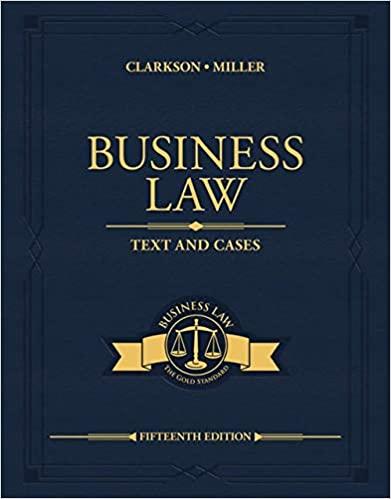Question
Equity and Trusts law questions: 1. In January 2006 a house worth 200,000 was bought in the name of Bette as the family home for
Equity and Trusts law questions:
1. In January 2006 a house worth 200,000 was bought in the name of Bette as the family home for Bette and Ham, who were cohabiting at the time. Ham paid the deposit of 10,000, Bette paid 100,000 from her savings and the remainder was provided by a mortgage loan of 90,000. Bette paid all the mortgage repayments directly, while Ham paid all other outgoing household expenses from his earnings. Ham also used his skills as an artist to paint the ceilings in each of the rooms, which, it was estimated, added a further 5,000 to the market value of the house. They never discussed their respective shares in the property.
Recently, Bette and Ham had a heated argument, and Bette moved out of the house to stay with her mother. Ham changed the locks on the front door. Bette now wants to sell the house. Ham says that he always presumed that the house belonged to them both jointly.
Advise Ham.
2. The only meaningful criticisms of the current legal position in trusts of the family home lie in the failure of the judges to take non-monetary contributions into account when determining the availability or nature of an interest. These concerns are increasingly being met by the intervention and growth of estoppel claims, which bring a welcome flexibility to the law, albeit at the expense of clarity.'
Critically analyse the role of proprietary estoppel in the acquisition of an interest by the nonlegal owner of the family home in the light of the above statement.
3. From Sarah Beresford's perspective, which types of performativity does the law prioritise in the process of dividing interests in the family home?
4. Putting the pieces together; Estoppel and implied trusts:
In 2007, Ingrid, her partner, Vincent, and her father, Boris, decided to buy 'Mockingbird Heights' as a home for the family. Ingrid and Vincent paid equal shares of the 50,000 deposit. The remaining 150,000 of the purchase price was provided by a loan, which was only obtained after Boris was joined as a party to the loan by Ingrid and Vincent. In consequence, Ingrid assured Boris that he would always be welcome to live in the family home.
Vincent wanted to be put on the legal title but was told by Ingrid that it would increase his liability to tax, so title was registered in the name of Ingrid solely. Subsequently, Vincent used his income to pay the housekeeping and other outgoings on the property to allow Ingrid to make the loan repayments, and Boris did the housework and tended the garden while Ingrid and Vincent were at work.
Ingrid has recently moved out of 'Mockingbird Heights' to live with her new lover, Cushing, and has written to Vincent and Boris asking them to leave, as she wants to sell the property.
Advise Vincent and Boris as to their interests, if any, in 'Mockingbird Heights'.
5.'The quantification of rights under a trust is now possible on ground of what is fair between the parties, no matter how the interest has in fact been acquired, although Lady Hale in Stack v Dowden (2007) has clothed 'fairness' in 'a series of factors.'
Critically analyse the above statement in relation to the quantification of an interest in the family home.
Step by Step Solution
There are 3 Steps involved in it
Step: 1

Get Instant Access to Expert-Tailored Solutions
See step-by-step solutions with expert insights and AI powered tools for academic success
Step: 2

Step: 3

Ace Your Homework with AI
Get the answers you need in no time with our AI-driven, step-by-step assistance
Get Started


